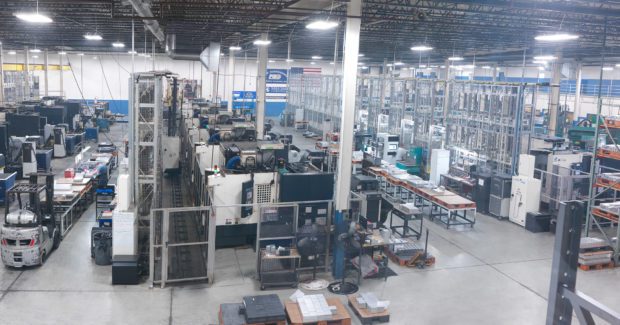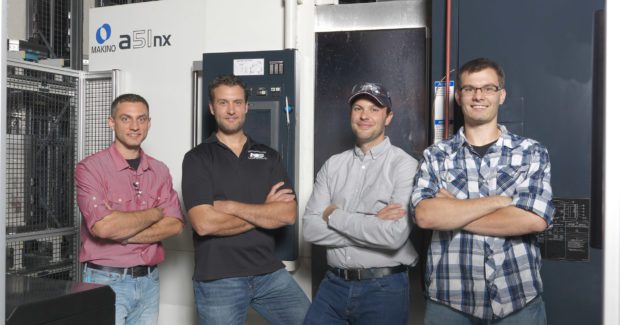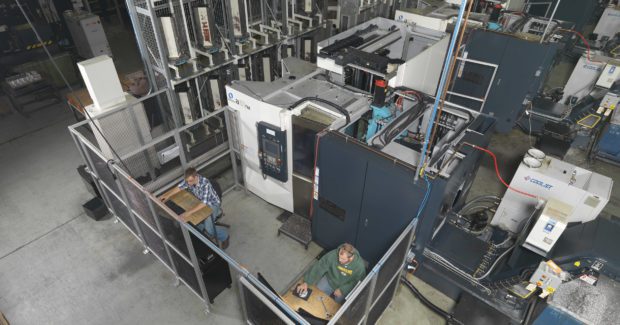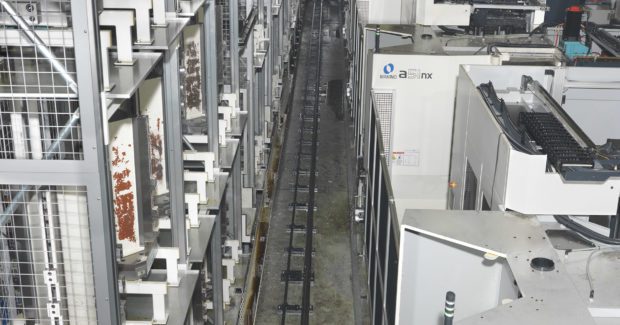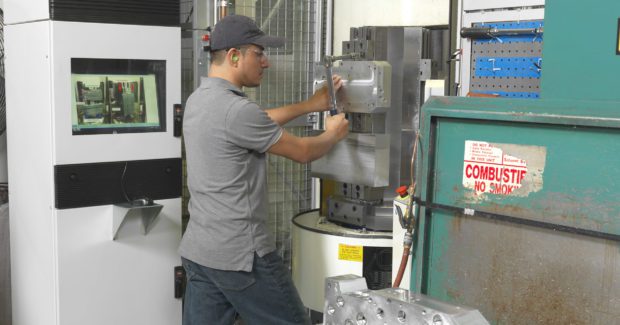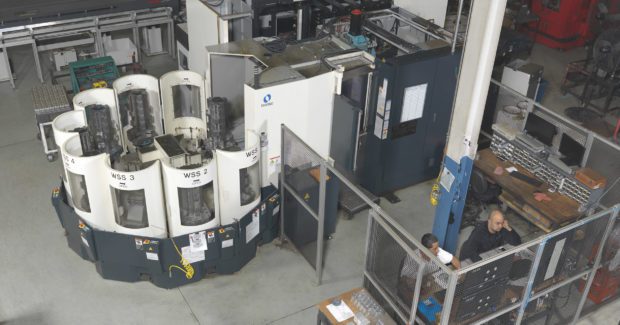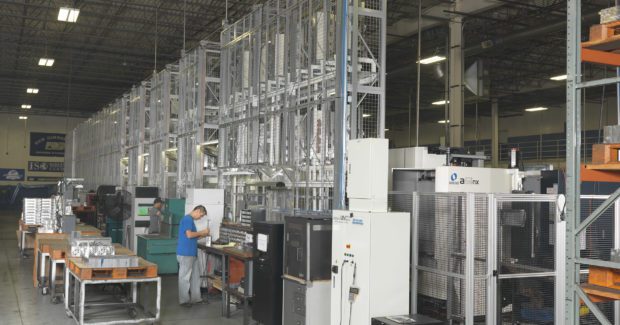New Dimensions in Flexible Manufacturing Systems
In today’s demanding environment, this shop proves how automation has never had so much potential to transform a business.
Posted: July 29, 2016
Today, customers do less annual forecasting. They reduce inventory in favor of just-in-time (JIT) delivery. They do not combine shipments and they want all of their parts in small batches. This makes the need for quick turnaround urgent, with continued pressure to keep pricing low. In this environment, automation has never had so much potential to transform a business: it puts shops in the driver’s seat to lower their costs, increase throughput and improve quality as market conditions continue to change. New Dimensions Precision Machining, Inc. (Union, LI) knows that flexibility is the key to handling this sort of environment, and they’ve discovered how to efficiently meet these demands by moving toward a fully automated production operation.
“Several years ago, we did a lot of what I like to call ‘highway driving’ production,” recalled Brian Halwix, the director of team development at New Dimensions. “We had vertical machining centers continuously run large batches that allowed us to coast for miles without changing gears. That has all changed. Now we do ‘city driving’ production, with many starts and stops. We only go a few blocks before hitting another traffic light. It no longer makes sense to spend a half hour setting up a VMC that only runs one hour of production. To remain competitive, we must get better city mileage. Our flexible manufacturing systems and high performance machine tools put us directly behind the wheel. We can be efficient no matter what the road conditions are or where that road takes us.”
For the last decade, his shop has followed an aggressive plan to add this type of flexibility. They started by replacing their VMCs with high-performance horizontal machining centers. Then they began to automate by purchasing four a61 horizontal machining centers and an MMC2 automated pallet handling system from Makino Inc. (Mason, OH) that linked the HMCs, cell control software and pallet loaders. The success of this flexible manufacturing system led the shop to add two a61nx machines to that cell. Now they have three MMC2 cells on the shop floor: In addition to that first system, another one was created with four a51 HMCs and two a51nx machines. A third cell features six a51nx machines. All six machines within each of the three flexible manufacturing systems run parallel processes, with five jobs in production at a time that are prioritized and coordinated by an MAS-A5 cell controller.
IF YOU DO SOMETHING, DO IT RIGHT
Founded as a small job shop in 1987, New Dimensions specializes in producing precision hydraulic manifolds. They have grown into a world-class organization, but still remain very much a family business. Four of the owner’s sons work alongside other family members and many employees with over 20 years at the company. The company excels in the fluid power market through a strong backbone of automated technologies that enable them to handle most any job, from small job shop projects to larger production orders, where 70 percent of the parts are aluminum and the rest are composed of iron and carbon steels.
According to Brian and Martin Halwix IV, their director of business development, the philosophy since their father started the business has always been, “if you are going to do something, do it right.” This is why they have always invested in high performance machines that produce premium parts, following a road to flexibility that evolved from 3-axis vertical machines to the three large, flexible cells that represent a substantial investment in automation. Brian pointed out that success with automation requires an internal commitment to work through any initial challenges related to the learning curve of the new technology. Their own personnel traveled to the Makino facility in Mason for training on macros and probes because they had not used them before. Now, with the right tooling and training, they produce up to 300 percent more parts per spindle than their previous stand-alone machines did – and the new equipment has many options to customize jobs and continually dial-in additional parameters that further optimize efficiency.
“These cells with the software-driven MAS-A5 system make producing parts on demand a reality,” stated Martin. “With this flexibility, we can quickly run 50 pieces while charging per-piece prices comparable to what we quoted back when we ran 500 to 1,000 parts. The larger pallet capacity and large tool capacity provide that changeability. We store up to 300 registered programs in each cell for active orders that can be accessed at any time without doing any setup at all in the machines.” Eliminating setups smooths the flow of smaller runs. Each MMC2 cell uses a 218-tool magazine, high pressure coolant, over 100 pallet storage locations and five different workset stations to efficiently manage a high-mix, low-volume flow of work over 24 hours a day, six days a week.
This flexibility supports their long-standing tradition of customer responsiveness, no matter what it takes. “When our customers are in a jam, they know we won’t let their urgent job sit on the bottom of a queue of work. We always move production schedules around to get those jobs on a machine as soon as possible, often the same day it is ordered,” said Marco Alejandre, the general manager of New Dimensions.
That’s not all. Besides large and small production orders, the shop also machines many prototype parts that may go through several revisions before moving into production. Some of these never make it into production. But instead of making prototypes on stand-alone machines that won’t interrupt the automated cells, the shop instead uses a custom pallet pool with an MAS-A5 system that links the machine doing prototypes to the three MMC2 cells via the company’s internal network.
The prototype machine is designed to accommodate larger tool capacities and additional fixtures so that its capabilities pair identically with the setups and processing methods used inside the cells. Each cell uses detailed tool and fixture drawings for the jobs it produces. This information is shared between the prototype machine and the MMC2 cells via the MAS-A5 to keep all processes standardized, enabling the shop to quickly and easily transition prototypes into full production orders. The programming and tooling on the prototype machine are connected to the MAS-A5 system so that its part data can be sent directly into the cells if a prototype goes into production. When a prototype is approved and sent into production on one of the cells, all of its programs, fixtures and tooling data transmit over too, because they are identical to those found in the cells.
THE HUMAN SIDE OF IT ALL
These flexible cells and pallet pool were certainly catalysts for change, but what really enhances their performance are the dedicated personnel assigned to each cell: an offline tooling manager and maintenance technician keep things running smoothly in each one. An automated tool management system in place in each cell connects to the MAS-A5 cell controller to directly link that line to the tooling department. This system is notified before a tool expires so that an order can automatically be placed and the new tool sent. It is monitored 24/7 as it feeds tool data into the cell, adjusts machine parameters or prompts a new tooling order.
Another key to uptime are dedicated preventive maintenance personnel that handle the grease, oil, lubrication and filter needs for the machines. They follow regular schedules and have automated inventory systems in place to make sure that all machines are serviced proactively. “While the machines have not needed much maintenance because they stand up to tough environments, we want to get the most out of them,” noted Martin. “So we dedicate a person to preventive maintenance.” With all of this automation, the shop can produce additional parts with the same number of employees. In fact, they more than doubled their production per employee and were able pass the reduction in costs over to their customers – a savings that helps address continued pricing pressures.
More automation has also increased the availability of technical positions at New Dimensions – jobs they are struggling to fill, so they have turned to local high schools to encourage young people to enter manufacturing. “Many parents don’t want their kids to pursue careers in manufacturing because they remember back when workers lifted heavy equipment or handled dangerous chemicals,” said Brian. “That is no longer the case. Modern facilities are clean, safe and filled with high-tech equipment. When we host student tours, we encourage the parents to come so that everyone can understand the types of opportunities that exist.”
He adds that one key to attracting and keeping young people is by using the kinds of technology that appeal to them: “Mobile phones can start and stop our machines. Our younger workers easily adapt to these sort of continual changes in our manufacturing operations. They help us easily keep up with change.” In fact, so many ideas have come from their machine operators that the shop fosters a culture of creativity with problem-solving teams to encourage new solutions. “I believe America’s manufacturing strength lies in creativity and innovation,” noted Brian, who also added that his company has hired several of those high school students.
Keeping employees creatively engaged is crucial to the growth of the company. “People today want to be part of something that is bigger than themselves,” explained Brian. “They want something they can be proud of. When a team loses vision, morale drops, growth stops and there’s a tendency to lose good people. Using high-tech equipment shows our teams that we are committed to and focused on a long-term future. I see continued growth ahead as we figure out how to move jobs from one cell to another, how to respond to our customers’ needs so they can be successful, how to use our flexibility to compete in any market, and how to serve global customers. Machining will continue to be our core competency, not necessarily a specific product.”
Martin agreed. “American manufacturing is all about responsiveness, flexibility and adaptability. This is the road we drive on, and automation keeps us in the driver’s seat.”
New Dimensions Precision Machining, Inc., 6614 South Union Road, Union, IL 60180, 815-923-8300, Fax: 815-923-8304, www.newdims.com.
Makino Inc., 7680 Innovation Way, Mason, OH 45040-8003, 513-573-7200, Fax: 513-573-7360, www.makino.com.





